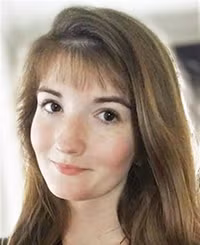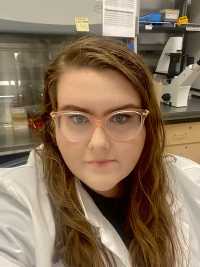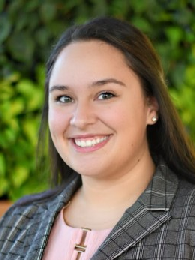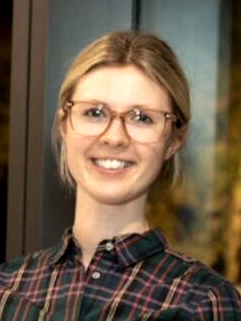CD-Cavs
Mailing Address
Cleveland State University
College of Arts and Sciences
2121 Euclid Ave.
Cleveland, OH 44115
Campus Location
Berkman Hall 218
Science and Research 353
Contact Us
Phone: 216-687-5580
artsandsciences@csuohio.edu
Current Trainees
NHLBI CD-Cavs T32 Training Program – our current Scholars!
Jessi Martin

I am a Ph.D. student in Applied Biomedical Engineering Graduate Program at Cleveland State University.
My focus is on the progressive development of Charcot arthropathy from peripheral neuropathy (PN) caused by diabetes mellitus. PN, and subsequently, Charcot have been known to disrupt the cardiovascular, peripheral nervous, and musculoskeletal system. This multi-body system disruption coupled with an undetected injury/prolonged inflammation can lead to bone resorption and arch instability in the midfoot, ultimately leading to midfoot arch collapse.
The best treatment for Charcot of the midfoot is early detection and clinical intervention. The challenge is that once Charcot manifests clinically, via x-rays, temperature changes, and/or vascular changes, the disease is already progressing towards collapse.
My current research involves the cross-disciplinary collaboration between: Dr. Brian Davis at CSU, Drs. Ahmet Erdemir and Georgeanne Botek, DPM, at the Cleveland Clinic, and Innovative Scientific Solutions Inc. in Dayton, Ohio. The goal is to develop a clinically viable in-shoe insole that can detect arch stability using shear and pressure forces under the foot and correlate/detect early arch collapse in patients with Charcot arthropathy of the midfoot.
My passion lies in the intersection of cell and tissue physiology and its manifestation and impact on the cardiovascular, musculoskeletal, and nervous system. I plan to use my education and experiences to help design devices and therapies to treat complex multi-organ system diseases such as Charcot arthropathy.
Rachael White

I am a Ph.D. student in the Graduate Program in Regulatory Biology, and I am conducting my research in the laboratory of Dr. Merlin Nithya Gnanapragasam, in the Department of Biological, Geological and Environmental Sciences (BGES) and the Center for Gene Regulation in Health and Disease (GRHD).
We study the process of mammalian erythropoiesis. My studies investigate the role of EKLF, a master regulator transcription factor, in erythropoiesis with its interaction with Aurora B Kinase. EKLF plays a major role in erythropoiesis that includes terminal erythroid differentiation, and hemoglobin switching. When EKLF is compromise, it can affect different blood disorders including Congenital Dyserythropoietic and Sickle Cell Anemias, and β Thalassemia. Understanding the development of red blood cells is vital when it comes to discovering new treatments for blood disorders.
Science and research are my passion in life. Understanding how the body operates at a molecular level has always interested me and how one small molecular change can have a vast effect on the whole body. I hope to use my degree from CSU to continue to do research and help to further the scientific field.
Luci Duncan

I am a Ph.D. student in Applied Biomedical Engineering Graduate Program at Cleveland State University.
I am performing my dissertation research in the laboratory of Dr. Josiah Owusu-Danquah in the Center for Human-Machine Systems. I work at the interface of mechanical engineering and applied biomedical engineering. My current research involves finite element analysis for assessing the interactions of implantable devices and surrounding tissues.
Coronary artery disease (CAD) is one of the leading causes of death worldwide. Atherosclerosis and stenosis are common occurrences in patients with CAD. Current treatment for narrowed arteries involves angioplasty and stenting. Despite advancements in medical device design, in-stent restenosis remains an issue. Therefore, continued research on the causes of restenosis and improved coronary stent design is still a critical need.
My dissertation project utilizes computational modeling to assess coronary stent and arterial tissue interactions. The hypothesis is that the stresses and interactive forces applied to coronary arteries by stents is the biggest contributor to in-stent restenosis.
My future plan is to continue expanding my knowledge in the field through immersion experiences. With my current position in the Center for Human-Machine Systems, I have developed a network of mentors who will guide me in discovering ways to immerse myself in the field and get hands-on experience.
Kara Timinski

I am a Ph.D. student in the Graduate Program in Regulatory Biology, conducting research in the laboratory of Dr. Kailash Gulshan, in the Department of Biological, Geological and Environmental Sciences (BGES) and the Center for Gene Regulation in Health and Disease (GRHD).
The focus of my research is on identifying novel therapeutic targets for treating cardiovascular disease (CVD). More specifically, I am working to decipher the mechanisms regulating disulfiram (DSF) autophagy and efferocytic activity in context of atherosclerosis. Atherosclerosis, also known as hardening of arteries, is a leading cause of heart attacks and CVD. Autophagy (a process by which cells recycle nutrients) and efferocytosis (a process to clear dead cells from body) protects us from atherosclerotic plaque buildup and thus prevent CVD. I recently found that Disulfiram (an FDA-approved anti-alcoholism drug) is reducing inflammation and build up of atherosclerotic plaques in hyperlipidemic mouse model. I am currently using various mouse models to test the effect of Disulfiram on reverse cholesterol transport and autophagy and efferocytosis.
Mailing Address
Cleveland State University
College of Arts and Sciences
2121 Euclid Ave.
Cleveland, OH 44115
Campus Location
Berkman Hall 218
Science and Research 353
Contact Us
Phone: 216-687-5580
artsandsciences@csuohio.edu